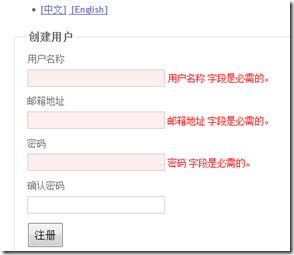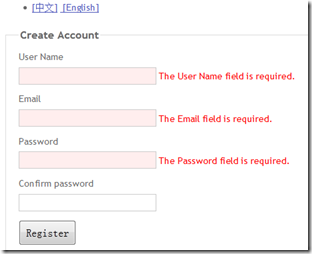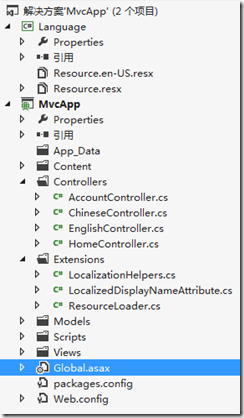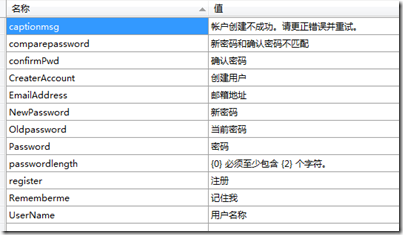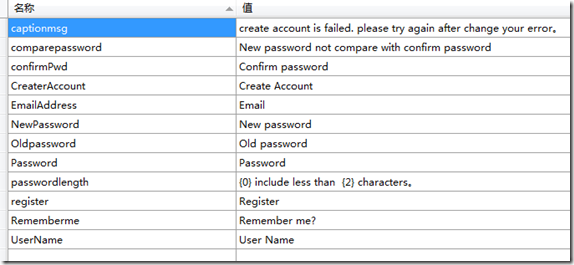[转载]Asp.net mvc全球化实例 – Lordbaby – 博客园.
通过MVC的路由机制来实现对当前线程的区域性来设定,然后重定向请求页面来实现对已绑定数据的语言之间的切换,例如中文zh-CN,英文en-US
实例只针对注册页面进行多语言话,在资源文件通过键值来定义语言,2个资源文件公用一个类。通常在开发时,只要一个默认的 Resource.resx,当开发完成之后,拷贝一个相同的Resource.resx,并改名字成上面的样子,然后手动或自动将其中的所有value 都翻译成对应的语言。
然后是核心的类
LocalizationHelpers的主要代码:
using System;
using System.Collections.Generic;
using System.Linq;
using System.Resources;
using System.Web;
using System.Web.Mvc;
using System.Web.WebPages;
using System.Threading;
using Language;
using System.Collections;
using System.Runtime.Caching;
namespace MvcApp.Extensions
{
public static class LocalizationHelpers
{
public static readonly ResourceManager recourseManager = new ResourceManager(typeof(Resource));
public static IHtmlString MetaAcceptLanguage<T>(this HtmlHelper<T> html)
{
var acceptLanguage = HttpUtility.HtmlAttributeEncode(System.Threading.Thread.CurrentThread.CurrentUICulture.ToString());
return new HtmlString(String.Format("<meta name='accept-language' content='{0}'>", acceptLanguage));
}
/// <summary>
/// 本地化获取资源值方法,用于web页面
/// </summary>
/// <param name="htmlhelper"></param>
/// <param name="key"></param>
/// <returns></returns>
public static string Lang(this HtmlHelper htmlhelper, string key)
{
return Lang(htmlhelper.ViewDataContainer as WebViewPage, key);
}
/// <summary>
/// 本地化获取资源值方法,用于web页面
/// </summary>
/// <param name="page"></param>
/// <param name="key"></param>
/// <returns></returns>
public static string Lang(this WebPageBase page, string key)
{
try
{
string cultureName = null;
if (page.Session["Culture"] != null)
{
cultureName = Thread.CurrentThread.CurrentCulture.Name;
}
else
{
//默认设置为中文
cultureName = "zh-CN";
Thread.CurrentThread.CurrentCulture = new System.Globalization.CultureInfo(cultureName);
Thread.CurrentThread.CurrentUICulture = Thread.CurrentThread.CurrentCulture;
page.Session["Culture"] = Thread.CurrentThread.CurrentCulture;
}
IEnumerable<DictionaryEntry> resxs = null;
resxs = GetResx(cultureName);
return (string)resxs.FirstOrDefault<DictionaryEntry>(x => x.Key.ToString() == key).Value;
}
catch
{
return "?";
}
}
/// <summary>
/// 当前web环境线程中,获取资源键值
/// </summary>
/// <param name="key"></param>
/// <returns></returns>
public static string Toi18nString(string key)
{
IEnumerable<DictionaryEntry> resxs = null;
resxs = GetResx(System.Threading.Thread.CurrentThread.CurrentUICulture.Name);
return (string)resxs.FirstOrDefault<DictionaryEntry>(x => x.Key.ToString() == key).Value;
}
/// <summary>
/// 当前web环境线程中,获取资源视图
/// </summary>
/// <param name="resxKey"></param>
/// <returns></returns>
private static IEnumerable<DictionaryEntry> GetResx(string resxKey)
{
ObjectCache cache = MemoryCache.Default;
IEnumerable<DictionaryEntry> resxs = null;
if (cache.Contains(resxKey))
{
resxs = cache.GetCacheItem(resxKey).Value as IEnumerable<DictionaryEntry>;
}
else
{
ResourceManager resource =new ResourceManager(typeof(Resource));
var resourceSet = resource.GetResourceSet(
Thread.CurrentThread.CurrentUICulture,
true,
true);
if (resourceSet != null)
{
resxs = resourceSet.Cast<DictionaryEntry>();
cache.Add(resxKey, resxs, new CacheItemPolicy() { Priority = CacheItemPriority.NotRemovable });
}
}
return resxs;
}
}
}
然后是重写DisplayName特性
using System;
using System.Collections.Generic;
using System.ComponentModel;
using System.Linq;
using System.Web;
namespace MvcApp.Extensions
{
public class LocalizedDisplayNameAttribute : DisplayNameAttribute
{
public LocalizedDisplayNameAttribute(string resourceKey)
{
ResourceKey = resourceKey;
}
public override string DisplayName
{
get
{
string displayName = LocalizationHelpers.Toi18nString(ResourceKey);//MyResource.ResourceManager.GetString(ResourceKey);
return string.IsNullOrEmpty(displayName)
? string.Format("[[{0}]]", ResourceKey)
: displayName;
}
}
private string ResourceKey { get; set; }
}
}
在model层所需要实现多语言的字段带个帽子
public class RegisterModel
{
[Required]
[LocalizedDisplayName("UserName")]
public string UserName { get; set; }
[Required]
[DataType(DataType.EmailAddress)]
[LocalizedDisplayName("EmailAddress")]
public string Email { get; set; }
[Required]
[StringLength(100, ErrorMessageResourceType = typeof(Resource), ErrorMessageResourceName = "passwordlength", MinimumLength = 6)]
[DataType(DataType.Password)]
[LocalizedDisplayName("Password")]
public string Password { get; set; }
[DataType(DataType.Password)]
[LocalizedDisplayName("confirmPwd")]
[System.Web.Mvc.Compare("Password", ErrorMessageResourceType = typeof(Resource), ErrorMessageResourceName = "comparepassword")]
public string ConfirmPassword { get; set; }
}
如果是必须字段可以通过ErrorMessageResourceType和ErrorMessageResourceName来自定义语言,也可以通过微软自带的JQuery的验证也实现了多语言。
语言之间的切换是通过改变区域性的Controller来实现的
public class EnglishController : Controller
{
//
// GET: /English/
public ActionResult Index()
{
System.Globalization.CultureInfo englishCulture = new System.Globalization.CultureInfo("en-US");
Session["Culture"] = englishCulture;
return this.Redirect(this.Request.UrlReferrer.ToString());
}
}
以前只是了解MVC这个东东,项目中用到了现在打算开始学习一下MVC,就从微软现成的学起吧,上面的例子只是实现了功能。
 Mikel
Mikel
